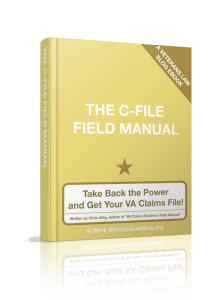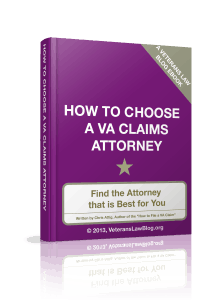Check your VA C-File to see if an “R. Epps” – an accredited representative at the VFW – was your representative before the VA.
If so, he may have sold you up the river, too.
From the beginning, I am going to say that there are good VSOs out there – this is not intended to ‘slam’ VSOs universally, but instead to get you thinking about who you trust – and don’t trust – to help when you file your own VA Claim.
How a VFW Representative Sold Out a Veteran.
The Veteran – we don’t know his era of service – was trying to get his PTSD service connected. He submits a private doctor’s opinion diagnosing the PTSD and assessing the severity of the Veteran’s limitations.
When he submitted his private medical opinion to the VA, VFW Service Representative R. Epps slipped this little gem into the file:
See what happened there?
A VSO that is supposed to be representing a Veteran’s interest in their claim just discredited the Veteran’s medical expert – TO THE VA.
The VFW Service Representative’s little trick worked, too – the VA seemed to put decreasing emphasis on the medical opinion because of what Mr. Epps said.
The Veterans Court was troubled by this, and here’s what they said:
“The Court is troubled by the submissions from a purported accredited representative who accepts the responsibility to advocate for the veteran; however, neither the Board nor this Court establishes and maintains the standards for representatives. See 38 C.F.R. §§ 14.629 (assigning responsibility for accrediting representatives to VA Office of General Counsel), 14.632 (establishing standards of conduct for representatives) (2014); see also Bates v. Nicholson, 398 F.3d 1355 (Fed. Cir. 2005) (concluding that the Board and this Court maintain jurisdiction to review a VA accreditation-cancellation decision).”
3 Takeaway points from this CAVC Decision.
This story comes from a July 11, 2014, Veterans Court decision. Read the whole decision here.
1) Chalk this up to another reason to get your VA C-File now!
The Veteran only found this note when he appealed to the Veterans Court and get a copy of the RBA (Record Before the Agency) from the VA attorney.
Had he requested his C-File before his BVA Hearing – hell, before his DRO Hearing – he would have been able to do “damage control” or, at the very least, fire Mr. Epps and get a representative that was looking after the Veterans’ best interest.
I cannot stress this enough – get your C-File before you file a single appeal. Not only is it the most important document in your VA claim, but you may find out the reason that the VA is denying your claim is in black-and-white in that file.
Maybe your VSO rep is selling YOU out right now.
Maybe the BVA is about to write a decision based on another Veteran’s medical records.
There is only one way to find out.
Would you rather find out now, or get screwed at the BVA or the Veterans Court first? Let me teach you, in our Veterans Law Field Manuals, how to get a copy of your C-File:
2) You’ll NEVER See a Veterans’ Attorney Pull That Kind of Stunt.
And I do mean NEVER!
Why?
Several reasons, but chief among them is that attorneys owe their clients a Duty of Loyalty. As the Texas Bar states in its ethical rules governing attorneys:
“Loyalty is an essential element in the lawyer’s relationship to a client.”
That Duty of Loyalty says that I can’t sell you up the river to the VA if I don’t like your private medical examiner’s opinion.
In fact, if an attorney did what VFW representative R. Epps did, not only could our client sue that attorney for legal malpractice, but I guarantee that every State Bar in this country would take away that attorney’s license to practice law.
The VSO representative has no such duty of loyalty to their Veteran “clients”. They can – and do – sell Veterans “up the river” all the time, although most times not on paper.
Here’s how to find an attorney that is the right fit for your VA Claim:
3) The Veterans Court was powerless to do anything about it.
The CAVC was troubled by this development – specifically that a VSO representative would do this to a Veteran they are supposed to represent.
Believe it or not, folks, that is stern language from a Court.
On this blog, I’m a bit more prone to speak my mind and use descriptors that you would NEVER see in a Court’s decision. Most appellate courts strive to be low-key, so that when they do use strong language like “troubled”, it sends a signal.
Frankly, I’d be “troubled”, too, if it didn’t happen so much.
VSO service representatives intentionally and negligently fail to put documents in the Veteran’s file, file sloppily worded appeals forms, miss deadlines, advise Veterans to take action that is improper for the case, recommend procedures that don’t exist in the regulations and so on.
Right now, my Firm is investigating an accredited VSO Service Representative who is using his position as a VSO rep to market his pension-poaching services to them.
I am not second guessing the Veterans Court here – and I am most assuredly NOT criticizing the Judge that authored the decision. My observations are “food for thought” – a hint to Congress, perhaps – to relook the scope of authority it has given the Veterans Court.
If a Veterans Court Judge becomes aware that an attorney has acted unethically, the Judge has a duty to refer that attorney to his governing State Bar to determine if disciplinary action should be taken.
If a Veterans Court Judge becomes aware that a VSO Service representative has acted unethically, the Judge should be able to address that issue immediately.
Years ago, when I represented Federal employees before the MSPB and EEOC, Administrative Judges had the authority – in fact the duty – to refer to the Office of Special Counsel any Federal employee that they believed committed certain prohibited personnel practices (ranging from discrimination to whistle-blower retaliation, to Hatch Act violations, etc).
Maybe the CAVC Judges should have that kind of ability – after all, we need to find a way to build integrity and trust into this VA Claims process. I think the Veterans Court is in a unique position to lead that charge.
Bottom Line – Get your VA C-File NOW!
Be careful who you trust with your VA claim.
If you trust your VSO, fine – there are some good ones out there. It is important for Veterans to have enough knowledge to “watch the watcher” – whether they use a VSO or hire an attorney. Just remember the words of Ronald Reagan:
“Trust but Verify.”
Get a copy of your C-File and make sure that your VSO isn’t selling you up the river.










“One bad apple don’t spoil the bunch” Mos Def quotes. But you certainly want to get rid of the “bad apples” who don’t play by the rules or the whole bin will spoil.
Today I read that the VA invesigated the shreding of Veterans documents in the Los Angles VA Regional Office. Simply, a senior manager deterimed that replacing an employee with very specific training and responsibility to oversee this procedue was no longer needed.
The just illustrates whay you say about reviewing your C-File to make sure critical documents about your claim have not gone to the shredder.
Ronald Reagan got it right: “Trust but Verify.”
I’m pretty new the the VA benefits claim process and learing how the “system” works. Please enlighten me, what is the minimum training a local VSOs receives before a Veteran shows up to file their first VA Claim?
Thanks, Merlin Berg
Merlin,
Most VSOs get absolutely NO training.
Would love to hear from any VSOs that follow this blog – what sort of training do you get before you work on your first Veteran’s claim?
Chris